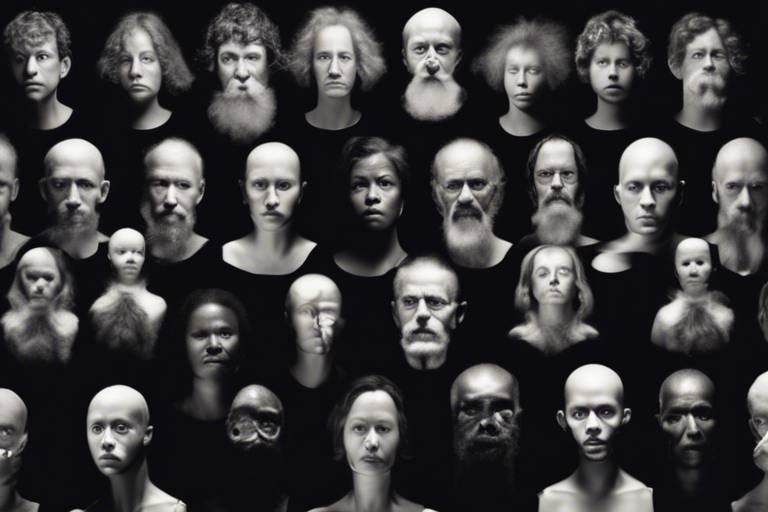Philosophy of Romantic Love - Defining Boundaries
Romantic love is a fascinating and intricate subject that has captivated the hearts and minds of people for centuries. It’s not just about the fluttering of hearts or the excitement of a first kiss; it’s a profound emotional experience that shapes our identities and influences our relationships. When we think of love, we often envision a fairytale romance, but the reality is much more complex. In this exploration, we will dive deep into the philosophical aspects of romantic love, focusing on the critical importance of setting boundaries. Boundaries are not merely walls that keep people out; they are essential frameworks that foster healthy interactions, allowing love to flourish while ensuring that both partners feel secure and respected.
Understanding romantic love requires us to look beyond the surface. It involves recognizing the emotional, ethical, and relational dimensions that come into play. Just like a well-tended garden, love needs boundaries to grow effectively. Without them, we risk overstepping, leading to misunderstandings and hurt feelings. Think of boundaries as the trellis that supports climbing vines; they give structure and direction to the love we share. In this article, we will explore how boundaries can enhance our romantic relationships, making them more fulfilling and meaningful.
In the realm of philosophy, romantic love has been dissected and discussed by thinkers throughout history. From Plato's lofty ideals to modern interpretations, the conversation around love continues to evolve. But one thing remains constant: the need for boundaries. As we navigate the complexities of love, it becomes evident that understanding and establishing these boundaries is crucial for emotional health and relational satisfaction.
As we journey through this exploration, we will not only define the nature of romantic love but also delve into historical perspectives that have shaped our current understanding. We will examine the ethical implications of love, emphasizing the significance of mutual respect and communication in maintaining healthy boundaries. By the end of this article, you will have a clearer understanding of how to cultivate a romantic relationship that thrives on respect, understanding, and love.
- What are boundaries in a romantic relationship? Boundaries are the limits we set regarding what we are comfortable with in a relationship. They can be emotional, physical, or even digital, helping to protect our well-being and foster respect.
- Why are boundaries important in romantic love? Boundaries help maintain a healthy balance in relationships, ensuring that both partners feel safe, respected, and valued. They prevent misunderstandings and promote open communication.
- How can I effectively communicate my boundaries? Open and honest communication is key. Discuss your needs and limits with your partner in a calm and respectful manner, and encourage them to share their boundaries as well.

The Nature of Romantic Love
Romantic love is often portrayed as a mystical force that sweeps us off our feet, but in reality, it is a complex and multi-faceted emotion. It's more than just a fleeting attraction; it's a deep connection that intertwines our identities and shapes our personal fulfillment. Imagine it as a delicate dance, where two individuals move in sync, each step echoing their feelings, desires, and vulnerabilities. This dance can be exhilarating, yet it also requires a keen awareness of the rhythm—an understanding of where one partner ends, and the other begins.
At its core, romantic love is an intricate blend of passion, intimacy, and commitment. Passion ignites the initial spark, often characterized by physical attraction and an overwhelming desire for closeness. Intimacy deepens this connection, allowing partners to share their innermost thoughts, dreams, and fears. Commitment solidifies the bond, creating a foundation for a lasting relationship. Together, these elements create a rich tapestry of emotions that can bring immense joy but can also lead to heartache if not navigated carefully.
Moreover, romantic love is influenced by various factors, including cultural background, personal experiences, and societal expectations. Each of us carries a unique set of beliefs and values about love, shaped by our upbringing and environment. For instance, in some cultures, love is celebrated as a lifelong partnership, while in others, it may be seen as a transient experience. This diversity in understanding can lead to misunderstandings and conflicts in relationships if partners are not attuned to each other's perspectives.
It's essential to recognize that romantic love is not static; it evolves over time. Initially, the infatuation phase may dominate, filled with excitement and novelty. However, as time progresses, love may transform into a more profound, stable affection that fosters companionship and mutual growth. This evolution is akin to a plant that starts as a fragile seed—requiring nurturing and care to bloom into a robust and beautiful flower.
Ultimately, the nature of romantic love challenges us to confront our own emotional landscapes. It invites us to explore our desires, fears, and boundaries. By understanding the complexities of love, we can cultivate healthier relationships that honor both ourselves and our partners. After all, love should not just be about passion but about building a partnership that thrives on respect, understanding, and shared growth.

Historical Perspectives on Love
Throughout the ages, love has been a subject of fascination and debate among philosophers, poets, and thinkers. The reveal not only the evolution of its understanding but also how cultural contexts have shaped our views on romantic relationships. From ancient Greece to modern times, the exploration of love has taken on various forms, each contributing to our current interpretations. Let's take a journey through time and examine some of the key philosophical viewpoints that have influenced our understanding of romantic love.
In ancient Greece, love was categorized into different types, each reflecting unique emotional and relational dynamics. The Greeks had a rich vocabulary for love, with terms like agape (unconditional love), eros (romantic love), and philia (friendship). This classification helped to delineate the complexities of love and its various manifestations. For instance, Plato, in his dialogues, often associated love with the pursuit of beauty and truth, suggesting that romantic love could elevate the soul and lead individuals toward a greater understanding of existence.
One of the most significant contributions to the philosophy of love comes from Plato. His work, particularly in "The Symposium," presents love as a motivating force that drives individuals to seek higher truths. According to Plato, love begins with physical attraction but should ideally evolve into a deeper appreciation for the beauty of the soul. This notion encourages individuals to look beyond mere physicality and strive for a connection that transcends the superficial, emphasizing the importance of emotional intimacy and intellectual compatibility in romantic relationships.
Moving forward in history, we encounter the thoughts of Aristotle, who provided a more pragmatic approach to love and relationships. He distinguished between different forms of love, particularly emphasizing the value of friendship. Aristotle believed that true love incorporates elements of friendship, where mutual respect, trust, and shared values play critical roles. He argued that romantic love should be built on a foundation of friendship, suggesting that the best romantic relationships are those where partners genuinely enjoy each other's company and share a deep emotional bond.
As we enter the modern era, philosophical discussions about love have expanded to include various psychological and sociocultural perspectives. Contemporary philosophers explore love not only as an emotion but also as a relational construct shaped by societal expectations and individual experiences. The rise of feminist and postmodern theories has further complicated traditional views, challenging the normative notions of love and encouraging a more inclusive understanding that recognizes the diversity of romantic relationships.
In summary, the historical perspectives on love reveal a rich tapestry of ideas that have evolved over time. From Plato's idealistic views to Aristotle's emphasis on friendship and modern theories that encompass emotional and relational dimensions, our understanding of romantic love continues to be shaped by philosophical inquiry. As we navigate our own romantic relationships, reflecting on these historical insights can help us appreciate the complexities of love and the importance of establishing meaningful connections with our partners.
- What is the significance of historical perspectives on love?
Understanding historical perspectives on love allows us to appreciate how cultural and philosophical shifts have shaped our current views and practices in romantic relationships.
- How did Plato and Aristotle differ in their views on love?
Plato emphasized the pursuit of beauty and truth in love, while Aristotle focused on the importance of friendship as a foundation for romantic relationships.
- What modern theories influence our understanding of love today?
Modern theories often incorporate psychological and sociocultural perspectives, emphasizing the emotional and relational aspects of love, as well as the diversity of romantic relationships.

Plato's View on Love
When we dive into the philosophical depths of love, Plato emerges as a beacon of insight. His perspective on love is not merely about fleeting emotions or physical attraction; instead, it represents a profound journey toward the pursuit of beauty and truth. In his dialogues, particularly in the Symposium, Plato presents love as a powerful force that can elevate the soul and guide individuals toward a higher understanding of existence.
Plato posits that love begins with an appreciation for physical beauty, but it should not end there. This initial attraction serves as a gateway to deeper connections, leading individuals to seek the beauty of the mind and, ultimately, the beauty of the divine. In this sense, love transforms from a mere physical desire into a philosophical quest. It’s akin to climbing a mountain; the first few steps might be about the view from the base, but as you ascend, the perspective shifts, revealing a breathtaking panorama that was previously hidden.
Moreover, Plato introduces the concept of the Platonic ideal, where love transcends the physical realm, aiming for the eternal truths that lie beyond the material world. This idea challenges us to reconsider our own relationships and the motivations behind them. Are we drawn to someone for their looks, or do we appreciate their intellect and character? Plato encourages us to reflect on the deeper dimensions of love and to aspire to connect with our partners on a more meaningful level.
In the context of romantic relationships, Plato's view emphasizes the importance of intellectual and emotional compatibility. He suggests that true love should inspire growth and enlightenment, allowing both partners to flourish. This notion leads us to ponder: how often do we engage in conversations that stimulate our minds? How frequently do we challenge each other to become better versions of ourselves? In a world where superficial connections are rampant, Plato's philosophy serves as a reminder that love should be a catalyst for personal and mutual development.
To summarize, Plato’s view on love is not just about the heart; it’s about the mind and soul's journey toward enlightenment. His ideas encourage us to seek relationships that foster growth and understanding, urging us to look beyond the surface and explore the depths of emotional and intellectual intimacy. In a society that often prioritizes physical attraction, Plato’s teachings remind us that the most profound connections are those that elevate us, guiding us toward a more profound appreciation of love itself.

Aristotle's Concept of Friendship
Aristotle, the eminent Greek philosopher, had a profound understanding of love, particularly in the context of friendship. He distinguished between three types of friendships: those based on utility, pleasure, and virtue. Each type reflects different motivations and expectations, shaping the dynamics of relationships. For Aristotle, the highest form of friendship is one grounded in virtue, where both individuals genuinely care for each other’s well-being and strive for mutual growth.
Friendship, according to Aristotle, is not merely about companionship but also about the shared pursuit of the good life. He believed that true friends enhance each other's character and help one another achieve their potential. This perspective on friendship provides a valuable framework for understanding romantic love, as romantic partners often embody these same qualities of support, respect, and shared values. In essence, romantic love can be seen as an extension of virtuous friendship, where emotional intimacy deepens the bond between partners.
Furthermore, Aristotle emphasized the importance of reciprocity in friendships, which is crucial in romantic relationships as well. He argued that a healthy friendship requires a balance of giving and receiving, ensuring that both individuals feel valued and appreciated. This balance is essential for establishing boundaries in romantic relationships, as it promotes mutual respect and understanding. Without this reciprocity, relationships can become one-sided, leading to feelings of resentment and disappointment.
To illustrate Aristotle's concept of friendship, consider the following table that summarizes the three types of friendships:
| Type of Friendship | Basis | Duration |
|---|---|---|
| Friendship of Utility | Mutual benefit or convenience | Short-term |
| Friendship of Pleasure | Shared enjoyment or fun | Variable duration |
| Friendship of Virtue | Mutual respect and admiration | Long-lasting |
In conclusion, Aristotle's insights into friendship provide a rich foundation for understanding romantic love. By recognizing the importance of virtuous connections, reciprocity, and shared values, we can cultivate healthier and more fulfilling romantic relationships. The lessons from Aristotle remind us that at the core of any loving relationship lies a strong friendship that nurtures both partners, ultimately leading to a deeper emotional bond.

Modern Philosophical Theories
In the realm of romantic love, modern philosophical theories have evolved significantly, reflecting the complexities of contemporary relationships. Unlike ancient philosophies that often idealized love, today's thinkers embrace a more nuanced understanding that considers emotional depth, relational dynamics, and the impact of societal norms. This shift acknowledges that love is not just a feeling but a multifaceted experience shaped by cultural, psychological, and ethical factors.
One prominent theory is the concept of relational ethics, which emphasizes the importance of mutual respect and understanding in romantic partnerships. In this view, love is seen as a collaborative journey where both partners actively contribute to the relationship's health. Philosophers like Julia Kristeva and Emmanuel Levinas argue that love must be grounded in ethical considerations, where each partner recognizes the other's autonomy and needs. This perspective fosters a deeper connection, allowing individuals to grow both together and independently.
Furthermore, modern theories often explore the intersection of love and identity. With the rise of individualism in society, many contemporary philosophers, such as Alain de Botton, suggest that romantic love is not solely about finding a partner but about understanding oneself. He posits that love acts as a mirror, reflecting our desires, fears, and insecurities. This self-awareness not only enriches the relationship but also helps in establishing healthy boundaries.
Another significant aspect of modern philosophical thought on love is the role of emotional intelligence. The ability to recognize, understand, and manage one’s emotions, as well as those of one’s partner, is increasingly regarded as essential for a successful romantic relationship. Philosophers and psychologists alike emphasize that emotional intelligence can lead to greater empathy, communication, and conflict resolution, all of which are vital in maintaining a loving partnership.
To summarize, modern philosophical theories on romantic love advocate for a more holistic approach that considers emotional, ethical, and relational dimensions. By recognizing the intricacies of love and the importance of boundaries, individuals can cultivate healthier and more fulfilling relationships. As we navigate the complexities of love in today's world, these modern perspectives offer valuable insights into how we can better understand and nurture our romantic connections.
- What is the significance of boundaries in romantic relationships? Boundaries are essential for ensuring mutual respect and understanding, allowing partners to feel safe and valued.
- How do modern philosophies differ from ancient views on love? Modern philosophies tend to focus more on emotional intelligence, relational dynamics, and ethical considerations, whereas ancient views often idealized love.
- Can love be considered an ethical practice? Yes, many modern philosophers argue that love is deeply intertwined with ethics, emphasizing mutual respect and understanding as foundational elements.

Ethics in Romantic Relationships
When we think about romantic relationships, the word ethics might not be the first thing that comes to mind. However, it plays a crucial role in shaping the dynamics between partners. Ethics in romantic relationships is all about understanding what is right and wrong, and how our actions impact not just ourselves but also the people we care about. It’s like navigating a complex maze—one wrong turn can lead to misunderstandings and hurt feelings, while a thoughtful approach can foster deeper connections and mutual respect.
At the heart of ethical romantic relationships lies the concept of boundaries. Setting and respecting boundaries is essential for ensuring that both partners feel safe, valued, and understood. But what exactly do we mean by boundaries? They can take various forms, including:
- Emotional Boundaries: These involve understanding and respecting each other's feelings and emotional space. It’s about recognizing when to give support and when to give space.
- Physical Boundaries: This refers to personal space and physical touch. Each person has different comfort levels, and it’s vital to communicate these openly.
- Digital Boundaries: In our tech-driven world, knowing how to navigate social media interactions and digital communication is increasingly important. It’s about respecting privacy and understanding what is acceptable in the online realm.
Ethical behavior in romantic relationships also encompasses mutual respect. This means valuing each other’s opinions, feelings, and choices. When both partners feel respected, they are more likely to communicate openly and honestly. Think of it as a dance; when both partners are in sync, the performance is beautiful. However, if one partner steps out of line, the entire routine can falter.
Moreover, ethical considerations also involve being transparent about intentions and feelings. If one partner is looking for something serious while the other prefers a casual arrangement, it’s crucial to communicate these desires clearly. This transparency not only helps in avoiding misunderstandings but also builds a foundation of trust. Trust is the bedrock of any romantic relationship; without it, the structure can easily crumble.
In summary, ethics in romantic relationships is about creating a space where both partners can thrive. By setting boundaries, practicing mutual respect, and maintaining open lines of communication, couples can navigate the complexities of love more effectively. It’s a continuous journey of understanding and growth, and when approached with care, it can lead to fulfilling and lasting connections.
Frequently Asked Questions
- What are the most important boundaries in a romantic relationship? Emotional, physical, and digital boundaries are crucial for maintaining a healthy relationship.
- How can I communicate my boundaries effectively? Use clear, open, and honest communication. Be direct about your needs and listen to your partner's feelings as well.
- Why is mutual respect important in a relationship? Mutual respect fosters trust and understanding, which are essential for a healthy and lasting relationship.

The Importance of Boundaries
Setting boundaries in romantic relationships is not just an option; it is a necessity for emotional health and well-being. Think of boundaries as the invisible lines that define where one partner ends and the other begins. Without these lines, relationships can become chaotic, leading to misunderstandings, resentment, and even heartbreak. Just like a well-tended garden needs fences to keep out unwanted weeds, romantic relationships thrive when both partners establish clear boundaries that promote mutual respect and understanding.
When we talk about boundaries, we’re not just referring to physical space, but also emotional and psychological limits. These boundaries help partners communicate their needs and expectations effectively. For example, if one partner feels overwhelmed by constant texting throughout the day, it’s crucial for them to express this feeling. A healthy relationship allows for such conversations, fostering an environment where both partners feel safe to voice their thoughts and feelings.
Moreover, boundaries contribute to a sense of identity within the relationship. They allow individuals to maintain their personal interests, friendships, and passions, which can often be overshadowed by the intensity of romantic love. It’s essential to remember that while love is about connection, it should not come at the expense of losing oneself. Having clear boundaries enables partners to support each other’s growth, encouraging a dynamic where both individuals can flourish.
Additionally, boundaries play a critical role in managing conflict. When disagreements arise, having established limits can guide couples in resolving issues constructively rather than destructively. For instance, if one partner knows that shouting or name-calling is off-limits, they are more likely to approach conflicts with a calm demeanor, leading to healthier resolutions. In this way, boundaries serve as a roadmap for navigating the sometimes turbulent waters of romantic relationships.
To further illustrate the importance of boundaries, consider the following table that outlines different types of boundaries and their significance:
| Type of Boundary | Description | Significance |
|---|---|---|
| Emotional Boundaries | Limits on emotional involvement and support. | Protects against emotional burnout and fosters self-care. |
| Physical Boundaries | Personal space and physical touch preferences. | Ensures comfort and consent in physical interactions. |
| Digital Boundaries | Limits on sharing personal information online. | Protects privacy and maintains trust in the relationship. |
In conclusion, establishing boundaries is essential for nurturing healthy romantic relationships. They not only protect individual well-being but also enhance the overall quality of the partnership. By communicating openly about needs and limits, partners can create a safe space where love can flourish without compromising personal identity or emotional safety.
- What are the signs that I need to set boundaries in my relationship? Look for feelings of discomfort, resentment, or emotional burnout. If you feel overwhelmed or unappreciated, it might be time to communicate your needs.
- How can I effectively communicate my boundaries? Use "I" statements to express your feelings clearly, such as "I feel overwhelmed when..." This approach encourages understanding rather than defensiveness.
- What should I do if my partner doesn’t respect my boundaries? It’s crucial to have an open conversation about the importance of those boundaries. If they continue to be disregarded, it may be necessary to reassess the relationship.

Types of Boundaries
When it comes to romantic relationships, understanding the is essential for fostering a healthy connection. Boundaries are like invisible lines that define where one person's feelings, needs, and responsibilities end and where another's begins. They help protect our emotional well-being, ensuring that both partners feel respected and valued. Without clear boundaries, relationships can become chaotic and unhealthy, leading to misunderstandings and conflict.
There are several key types of boundaries that play a significant role in romantic relationships:
- Emotional Boundaries: These boundaries pertain to how partners share their feelings and manage emotional intimacy. Emotional boundaries help individuals express their needs and protect their emotional health. For instance, if one partner feels overwhelmed by their partner's emotional demands, it's crucial to communicate that need for space.
- Physical Boundaries: These relate to personal space and physical touch. Each partner has different comfort levels regarding physical affection, and recognizing these preferences is vital. For example, one partner may enjoy holding hands in public, while the other may prefer to keep physical affection private.
- Digital Boundaries: In today's tech-savvy world, digital boundaries have become increasingly important. This includes how couples interact on social media and what level of privacy they expect regarding personal devices. Establishing these boundaries can prevent misunderstandings and ensure that both partners feel secure in their digital interactions.
Each type of boundary plays a unique role in maintaining a balanced relationship. Think of them as the foundation of a house. Just as a house needs a solid foundation to stand tall, relationships require well-defined boundaries to thrive. When boundaries are respected, partners can enjoy a sense of safety and trust, allowing love to flourish.
It's important to note that boundaries are not meant to create distance but rather to foster a deeper connection. They allow individuals to maintain their sense of self while also being part of a couple. For example, consider a garden: it needs fences to protect the plants inside while allowing sunlight and rain to nourish them. Similarly, boundaries protect the emotional garden of a relationship, ensuring it grows healthily.
In conclusion, recognizing and respecting the different types of boundaries in a romantic relationship is crucial for emotional health and mutual respect. By openly discussing these boundaries, partners can create a safe space where love can thrive without fear of overstepping or misunderstanding each other's needs.
Here are some common questions regarding boundaries in romantic relationships:
- What are the signs of unhealthy boundaries? Unhealthy boundaries often manifest as feelings of resentment, anger, or discomfort in a relationship. If one partner consistently feels overwhelmed or controlled, it may indicate a need for clearer boundaries.
- How can I communicate my boundaries effectively? Start by being honest and direct about your feelings. Use "I" statements to express your needs, such as "I feel uncomfortable when...". This approach helps avoid blame and encourages open dialogue.
- Can boundaries change over time? Absolutely! As relationships evolve, so do individual needs and comfort levels. It's important to revisit and adjust boundaries as necessary to ensure both partners feel respected and understood.

Communicating Boundaries
Communicating boundaries in romantic relationships is not just important; it's essential for the health and longevity of the partnership. Think of boundaries as the invisible lines that define our personal space, emotional needs, and expectations. When these lines are clearly drawn and respected, relationships can flourish. However, when they are ignored or misunderstood, it can lead to misunderstandings, resentment, and even heartbreak. So, how do we effectively communicate these boundaries?
First, it's crucial to approach the conversation with openness and honesty. This means being willing to express your feelings and needs without fear of judgment. Imagine trying to navigate a maze without knowing where the walls are; it can be frustrating and confusing. Similarly, when we don't communicate our boundaries, we leave our partners guessing, which can lead to miscommunication and hurt feelings. It's helpful to use "I" statements, such as "I feel overwhelmed when..." or "I need some time to myself when...". This way, you take ownership of your feelings and create a safe space for dialogue.
Next, timing is everything. Choose a moment when both partners are calm and open to discussion. If one partner is stressed or distracted, it may not be the best time to dive into such an important topic. A relaxed setting can set the tone for a more constructive conversation. You might even consider setting aside a dedicated time for this discussion, making it clear that both partners' feelings are a priority.
Additionally, it's important to listen actively. This means not just hearing the words but also understanding the emotions behind them. When your partner shares their boundaries, respond with empathy and validation. You might say, "I understand that you need this space, and I respect that." This helps create a culture of mutual respect where both partners feel valued and heard.
Sometimes, it can be helpful to visualize the boundaries you are discussing. You might create a simple table to outline what each partner needs. For example:
| Boundary Type | Partner A's Needs | Partner B's Needs |
|---|---|---|
| Emotional | Needs time alone to recharge | Needs reassurance during stressful times |
| Physical | Prefers cuddling on the couch | Needs personal space while sleeping |
| Digital | Wants to keep social media private | Is comfortable sharing passwords |
By laying it all out, both partners can see where they stand and where adjustments might be needed. Remember that boundaries are not set in stone; they can evolve as the relationship grows. Regular check-ins can help ensure that both partners feel comfortable and respected.
Finally, be prepared for some trial and error. Not every conversation will go smoothly, and that’s okay! The key is to remain patient and willing to adapt. Relationships are a dance, and sometimes you might step on each other's toes. But with practice and communication, you can learn to move in sync.
In conclusion, communicating boundaries is not just about setting limits; it’s about creating a safe space for both partners to express themselves. When done effectively, it can lead to deeper intimacy and a stronger bond. So, take that leap, open the dialogue, and watch your relationship thrive!
- What are boundaries in a romantic relationship? Boundaries are guidelines that help partners understand each other's emotional, physical, and digital needs.
- Why are boundaries important? They foster mutual respect, prevent misunderstandings, and promote healthier connections.
- How can I start a conversation about boundaries? Approach the topic with openness, choose a good time, and use "I" statements to express your feelings.
- What if my partner doesn't respect my boundaries? It’s important to address this directly and discuss the impact it has on your relationship.
Frequently Asked Questions
- What is the essence of romantic love?
Romantic love is more than just a fleeting emotion; it's a complex blend of passion, intimacy, and commitment. It shapes our identities and influences our relationships with others. Think of it as a deep connection that goes beyond physical attraction and taps into our emotional and psychological needs.
- Why are boundaries important in romantic relationships?
Boundaries are crucial because they help define what is acceptable and what isn’t in a relationship. They foster mutual respect and understanding, ensuring that both partners feel safe and valued. Imagine boundaries as the invisible lines that keep the relationship healthy and prevent misunderstandings.
- How can I effectively communicate my boundaries?
Effective communication of boundaries involves honesty and clarity. Start by expressing your needs openly and calmly. Use "I" statements to share how you feel, and encourage your partner to do the same. Think of it as a dance where both partners need to be in sync to create a harmonious relationship.
- What are the different types of boundaries in romantic relationships?
There are several types of boundaries, including emotional, physical, and digital. Emotional boundaries protect your feelings, physical boundaries define personal space, and digital boundaries cover online interactions. Understanding these types can help you navigate your relationship more effectively.
- How do historical perspectives on love influence our understanding today?
Historical perspectives, like those from Plato and Aristotle, provide foundational insights into the nature of love. These philosophies continue to shape contemporary discussions about love, helping us understand its complexities and guiding how we approach romantic relationships today.
- What role does ethics play in romantic love?
Ethics in romantic love is all about respect and responsibility. It involves understanding the impact of our actions on our partners and ensuring that our relationships are built on trust and honesty. Think of it as the moral compass that guides our interactions with those we love.



















